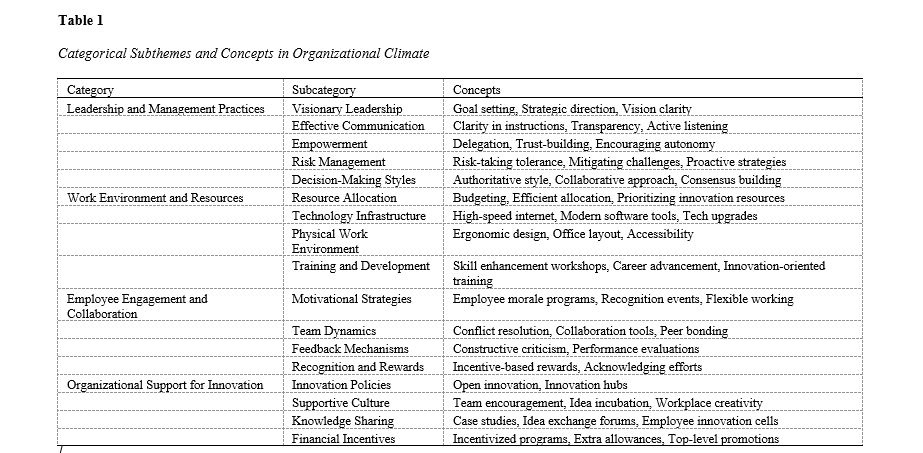How Organizational Climate Influences Innovation: A Qualitative Inquiry into the Commerce Sector
Keywords:
Organizational climate, innovation, leadership practices, employee engagement, Resource Allocation, commerce sector, qualitative researchAbstract
Methodology: A qualitative research design was employed, using semi-structured interviews with 21 professionals in Tehran’s commerce sector. Purposeful sampling ensured the inclusion of participants with direct experience in organizational innovation. Interviews continued until theoretical saturation was reached, capturing diverse perspectives. Thematic analysis was conducted using NVivo software, identifying key themes and subthemes that explain the influence of organizational climate on innovation. The study identified four main themes: leadership and management practices, work environment and resources, employee engagement and collaboration, and organizational support for innovation. Visionary leadership, effective communication, and resource allocation emerged as critical enablers of innovation. Employee engagement strategies, such as team dynamics and recognition mechanisms, also played a pivotal role. Barriers to innovation included insufficient resources and resistance to change. The findings align with previous studies, emphasizing the importance of a supportive and collaborative climate in fostering innovation. The study highlights the multifaceted role of organizational climate in shaping innovation within the commerce sector. Leadership styles, resource management, and employee engagement are critical drivers of innovation. Organizations should prioritize creating a positive climate by investing in leadership development, enhancing resource accessibility, and fostering a culture of collaboration and recognition. These strategies can enable organizations to remain competitive in rapidly changing markets.
References
Adamska, K., Kosakowska‐Berezecka, N., Jurek, P., & Konarski, R. (2022). Gender Perspectives on Self‐censorship in Organizations: The Role of Management Position, Procedural Justice and Organizational Climate. European Journal of Social Psychology, 52(3), 570-583. https://doi.org/10.1002/ejsp.2838
Akter, K. M., Tang, S. M., & Adnan, Z. (2023). Organizational Justice and Quality of Work Life in Hotels: The Mediating Effect of Trust Climate. Society & Sustainability, 5(1), 26-42. https://doi.org/10.38157/ss.v5i1.533
AlMulhim, A. F. (2023). Organizational Climate and Psychological Capital of University Faculty Members in Saudi Arabia: The Moderating Role of Innovative Organizational Culture. Problems and Perspectives in Management, 21(1), 35-47. https://doi.org/10.21511/ppm.21(1).2023.04
Azimzadeh, S. m. (2023). Th investigation of the relationship between organizational citizenship behavior and organizational climate and the moderating role of demographic variables. Sport Management Studies. https://doi.org/10.22089/smrj.2023.3761
Dehnavi, M. H., Shirazi, A., & Nazemi, S. (2021). Exploring and Explaining the Antecedents of Emotional Climate of Organization in National Iranian Oil Products Distribution Company. Modiriat-e- farda, 65(19), 241-254. http://rimag.ir/fa/Article/26135
Esmaeili, A., Rahimi, F., & Nadaf, M. (2021). Studying the effect of organizational coaching on workplace counterproductive behaviors: mediating role of positive organizational climate (Vol. 21). Tarbiat Modares University. https://mri.modares.ac.ir/article_430.html?lang=en
Franco, C., & Landini, F. (2022). Organizational drivers of innovation: The role of workforce agility. Research Policy, 51(2), 104423. https://doi.org/10.1016/j.respol.2021.104423
Haji Aghanajad, Y., & Angazi Ghods, E. (2022). The Relationship Between Dimensions of a Collaborative Work Climate and Organizational Commitment of Employees. Industrial and Organizational Psychology Studies, 9(1), 169-186. https://doi.org/10.22055/jiops.2022.41824.1300
Hamid, F., Widodo, S. E., & Buchdadi, A. D. (2022). The Influence of Transformational Leadership, Emotional Intelligence, Organizational Climate, and Teamwork, Towards Organizational Citizenship Behavior of Civil Servants. International Journal for Applied Information Management, 2(3), 23-36. https://doi.org/10.47738/ijaim.v2i3.35
Kettaf, R. (2024). Investigating the Impact of Organizational Climate on Organizational Silence in Higher Education Institutions. Socioeconomic Challenges, 8(1), 170-182. https://doi.org/10.61093/sec.8(1).170-182.2024
Moradisaleh, A., Rangriz, H., Hassanpoor, A., & Abdollahi, B. (2021). Designing and Validating an Excellence Organizational Climate Model in Private Banks in Iran. The Journal of Productivity Management, 15(3 (58) Autumn), 163-184. https://www.vhnsnc.edu.in/naac2024/data/criteria/III/3.4/3.4.3/2019.pdf
Nwangwu, N. I., Etodike, C. E., Okeke, H. C., & Nnaebue, C. I. (2021). Organizational Climate Factors in Job Creativity Among Public University Librarians in Anambra State. South Asian Journal of Social Studies and Economics, 34-44. https://doi.org/10.9734/sajsse/2021/v10i130254
Parsakia, K., Namjoo, K., Arjmand, M., Sabzvand, A., Rahyan, H., Fazli, A., & Jamshidi, M. (2022). The mediating role of work engagement in the relationship between psychological climate and productivity and job satisfaction in teachers. International Journal of Innovation Management and Organizational Behavior (IJIMOB), 2(2), 8-23. https://doi.org/10.61838/kman.ijimob.2.2.2
Quan, X., Choi, M.-C., & Tan, X. (2023). Relationship Between Organizational Climate and Service Performance in South Korea and China. Sustainability, 15(14), 10784. https://doi.org/10.3390/su151410784
Rahimi, M., Bahmaee, L., & Barekat, G. H. (2023). Designing A Paradigmatic Model of Barriers to Innovation Management in Ahvaz Primary Schools. International Journal of Innovation Management and Organizational Behavior (IJIMOB), 3(4), 19-27. https://doi.org/10.61838/kman.ijimob.3.4.3
Rangriz, H., hassanpoor, A., abdollahi, b., & moradisaleh, a. (2020). Designing an excellent model of organizational climate. Strategic Management Studies of National Defence Studies, 10(40), 440-415. https://smsnds.sndu.ac.ir/article_1164.html
Rehman, W. u., Razzaq, K., & Zareen, M. (2020). Organizational Climate and Performance: Mediating Role of Affective Commitment, Knowledge Sharing Practices and Perceived Cost of Knowledge Sharing. International Journal of Management Research and Emerging Sciences. https://doi.org/10.56536/ijmres.v10i2.85
Sahib, A. A. A. H. M., & Ali, M. H. R. M. (2021). The Organizational Climate and its Impact on the Innovative Behavior of Auditors. Arab Journal of Administration, 41(1). https://journals.ekb.eg/article_151260.html
Sein Myint, N. N., Kunaviktikul, W., Akkadechanunt, T., Wichaikhum, O. A., & Turale, S. (2021). Nurses’ Qualitative Descriptions of the Organizational Climate of Hospitals. Journal of Nursing Scholarship, 53(4), 490-499. https://sigmapubs.onlinelibrary.wiley.com/doi/abs/10.1111/jnu.12645
Shad, S., & Zeinali, M., & Mohammadi, A., & Badavar Nahandi, Y. (2021). The Psychological Role of WorkPlace and Organizational Socialization in Improving Auditors' Ethics by Reducing Deviant Behaviors. Journal of Financial and Behavioral Researches in Accounting, 1(1), 87-106. https://www.magiran.com/paper/2361599
Woznyj, H. M., Heggestad, E. D., Kennerly, S., & Yap, T. L. (2019). Climate and organizational performance in long-term care facilities: The role of affective commitment. Journal of Occupational and Organizational Psychology, 92(1), 122-143. https://doi.org/10.1111/joop.12235
Zuraik, A., & Kelly, L. (2019). The role of CEO transformational leadership and innovation climate in exploration and exploitation. European Journal of Innovation Management, 22(1), 84-104. https://doi.org/10.1108/EJIM-10-2017-0142












